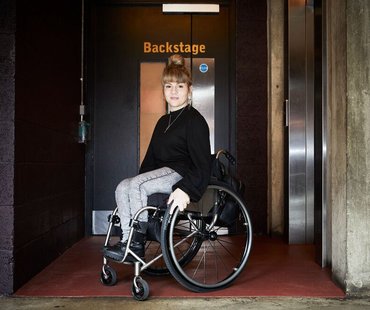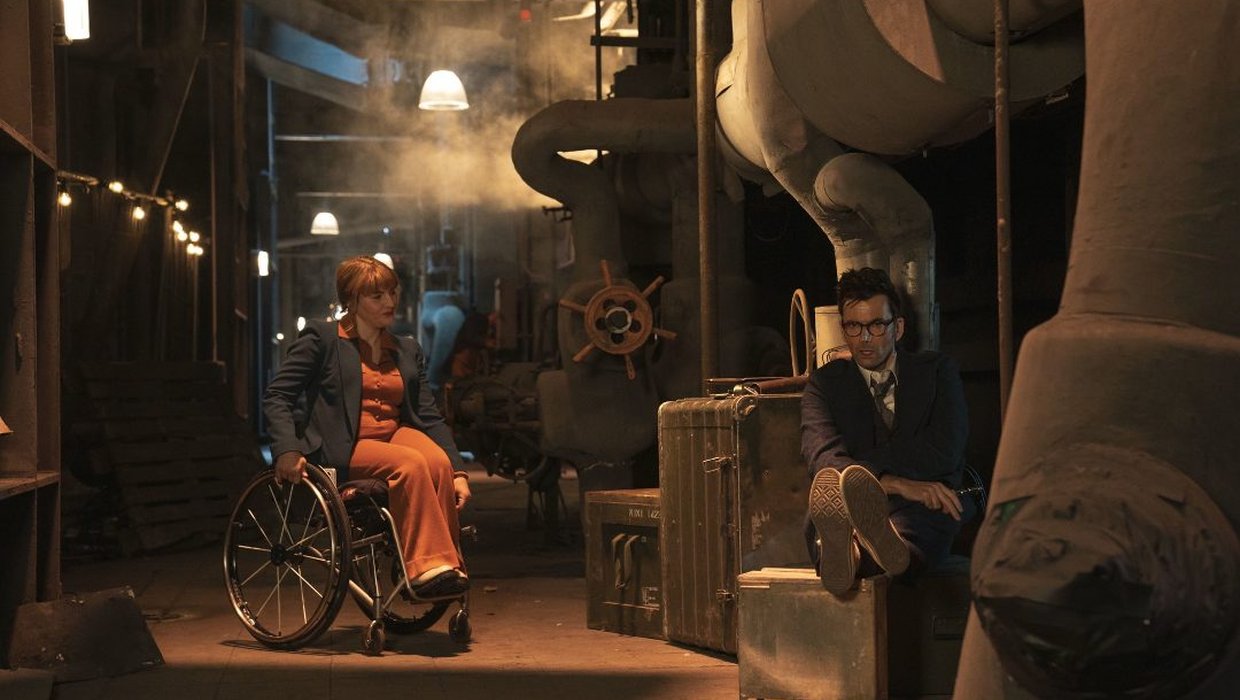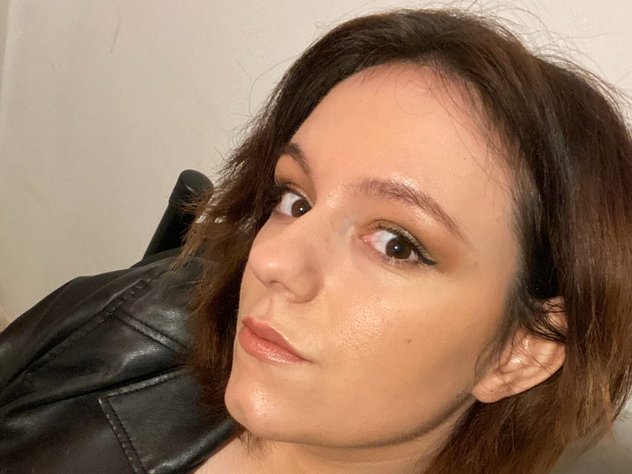The TARDIS has a ramp! Why Ruth Madeley in an accessible Doctor Who means the universe to us
Journalist Faith Martin's fan letter to Doctor Who. The ramp reveal and Ruth's role model are only the start; a disabled Doctor's possible…
Doctor Who is weaved into the fabric of my life, little fragments in time that have stuck with me forever. From the Daleks to K9 and The Ood, every character has bookmarked moments that shape my memories.
One of my earliest recollections of Doctor Who is from ‘The Runaway Bride’, due to the terrifying giant red spider Empress of the Racnoss that, as a five-year-old, I was convinced would eventually eat me alive. While my original memories of that episode are hazy due to my age at the time, the sheer joy of the unknown had me gripped by the television. Back then, the show held such grandiosity, partly due to my naivety at the world but mainly because that’s what Doctor Who has always been, balancing somewhere between real life and utter absurdity.
The Whoniverse provides a space for everyone. Sci-fi as a genre has typically been marketed towards men. However, strong female characters run through the DNA of this show; I will never deny my love for Donna. A strong, lairy, independent woman who definitely doesn’t need The Doctor, although one could argue that The Doctor definitely needed her. Catherine Tate’s undeniable wit and charm taught me to be assertive and stand my ground, which I would later grow up to rely on when communicating my needs as a young disabled person.

When I saw the TARDIS… I immediately burst into tears. Not only was it beautiful, but it was also accessible; time and space were now truly for everyone.
Faith Martin
Doctor Who is a place of acceptance for all in society, regardless of gender, sexuality, race, or disability. It’s a show where ‘weird’ is celebrated, the hero of the hour isn’t even human, and the kindest creatures are from undiscovered planets. It puts the viewer first, allowing their indulgence in the fantastical and offering up a heartfelt view of humanity in its day-to-day form. In a manufactured world built on comparison, Doctor Who has taught me the joy of the ordinary every day and how every single person affects our experience of the earth. To quote the 11th doctor, “In 900 years of time and space, I’ve never met anybody who wasn’t important.”


Ruth Madeley and an accessible TARDIS
Many characters are important to me as a disabled person. However, I don’t think anyone has felt more important to me than the new addition of Shirley Anne Bingham, played by Whizz Kidz ambassador Ruth Madeley.
As a wheelchair user, I was thrilled to find out Ruth had been cast in the show. Often, disabled people have been portrayed without any dimension of character, solely there to show misery or pain. To have such a strong, multifaceted character as a wheelchair user is an excellent step for representation; characters like Shirley are integral to showing what disabled life is like beyond the surface.
When I saw the TARDIS in the first anniversary special, I immediately burst into tears. Not only was it beautiful, but it was also accessible; time and space were now truly for everyone. Making a feature of this in episode three by unveiling the built-in ramp to Shirley was a wonderful nod to how easy it is to make the world a bit more wheelchair-friendly.


A new dimension for inclusion
‘The Giggle’ is now one of my favourite episodes ever; the way showrunner Russell T Davies incorporated accessibility throughout was a beautiful tribute to all disabled Whovians past and present. The way UNIT was completely accessible to Shirley, how stereotypes of ambulatory wheelchair use were tackled when Kate expressed how she didn’t believe Shirley needed her wheelchair because she could walk (something some fans even tweeted during the first episode because Shirley was seen to cross her legs), disability was not the storyline but instead simply a fact of life. I think if we can believe in aliens, we can most certainly believe in equality.
These specials have monumentally showcased not only the progression of the show but also society at large. Thinking back to just ten years ago, when I was 12, I never would’ve comprehended the idea of an accessible TARDIS or a wheelchair that fired bullets for the defence of the Earth; all of this is a testament to the show’s commitment to reflecting its audience. As well as to Ruth’s willpower as a disabled actor who is undoubtedly bringing a remarkable amount of change to the TV industry.


The reaction to Shirley’s character has been incredible and heartwarming, with endless social media buzz about true representation and how much it means to the disabled community. Fans crying because they’d finally seen themselves in a show they hold in such high regard, young disabled children growing up being accepted without a second thought.
On X, one fan expressed how the accessible TARDIS made her “tear up”, explaining how “seeing a show that I've loved for so long take a step to be so explicitly inclusive means so much to me”.
Disability campaigner Dan White described how his daughter Emily, who is a wheelchair user, cried in his arms when the accessible TARDIS was revealed.
Disabled Actor and producer Jennifer Kretchmer thanked Ruth Madeley for ‘’letting us, especially ambulatory chair users, proudly thrive in this universe. It means so much”.


Ruth's reaction to the ramp
Ruth Madeley has been speaking about what it meant to her after the last of the anniversary shows aired. “I’m not going to lie to you. When Russell told me we were putting a ramp in the TARDIS, I… I cried,” she said on The Giggle: Behind the Scenes video.
She explained how the TARDIS came to have a ramp. A fan who was a wheelchair user contacted showrunner Russell T Davies and said how much he admired his work, “even though I can’t get in the TARDIS because it’s not wheelchair accessible..."
Russell said, “So we change that. We change that.”
Ruth says this hit her “straight in the heart."
“I know what that will mean for the disabled community and many disabled Whovians… This is the first time the TARDIS has been wheelchair accessible, and to know it will be like that forever now… to be part of that change, it’s really special.”

The messages I've had from parents saying, ‘Do you have any idea what my child wants for Christmas now?’ I’m worried Whizz Kidz are going to be constantly asked for guns on their wheelchairs.
Ruth Madeley
I believe television is a catalyst for change. Doctor Who is spearheading that change across the universe, which will have a huge effect on disabled fans and actors alike. The glass ceiling has been smashed through completely to the possibility of a disabled Doctor in the future; who knows what wheelchairs look like on planets a billion light years away? Now, there’s no reason we can’t find out.
All that’s left to say is an enormous, heartfelt thank you to Ruth, Russell and the rest of the team at Doctor Who for allowing disabled people to shine forevermore.


Faith’s top 5 Doctor Who moments
The specials have created many incredible moments for inclusive television, but here are my top 5 moments across the three anniversary specials.
1. “Don’t make me the problem”
Shirley says, “Don’t make me the problem” when unable to use the stairs. It’s a line that will resonate with many disabled people as, so often, we are seen as a nuisance or ungrateful when asking for our basic needs to be met.
2. Tackling ableism head-on
As mentioned previously, there’s a scene where Kate implies Shirley doesn’t need her wheelchair because she can walk. While I’m not ambulatory myself, this will resonate with many wheelchair user who are never believed when talking about their experiences.


3. The Doctor and Doctor Donna
I think it’s clear that I love Donna Noble; the fact that both Catherine and David returned for these specials warmed my heart. Watching Ruth Madeley act alongside them was the icing on the cake.
4. Wheelchair weaponry
Rockets firing from a wheelchair?! It’s not a want but something I immediately need. Wheelchairs are cool already, but this made them sleek and exciting. As Ruth said in her interview for The Times Christmas Appeal: “The amount of messages I have had from parents saying, ‘Do you have any idea what my child wants for Christmas now?’ I’m quite worried that Whizz Kidz are going to be constantly asked for guns on their wheelchairs.”


5. Accessible TARDIS
I think the accessible TARDIS with a built-in ramp sets a precedent for how accessible the show can become for future disabled actors and why showing representation on screen is unbelievably important.


About Faith Martin
“I am a 22-year-old arts and culture journalist and disability rights champion, prominently campaigning for equal access to live events. I write for the Daily Mirror, Metro UK, and Gigwise. I’m a powered wheelchair user who can be regularly found at concerts and festivals. As well as this, I’m a self-confessed geek. Doctor Who is one of my main passions when it comes to sci-fi, and my favourite Doctors include but aren’t limited to David Tennant and Matt Smith. I also hope to see the Tardis one day!"



